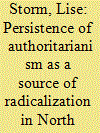| Srl | Item |
| 1 |
ID:
087378


|
|
|
|
|
| Publication |
2009.
|
| Summary/Abstract |
The argument put forward in this
article is that while the radicalization
of Islamists is undoubtedly
taking place in North Africa, it
is not possible to devise a formula that
enables us to predict why people become
radicalized or who these people are.2 Of
course, it is feasible to identify a number
of radicalized and sometimes violent Islamist
groupings, but their emergence, membership
base and modus operandi do not
conform to a particular pattern. In short,
the radicalization of Islamists is a highly
complex phenomenon. With regard to violent
radicalization, one member of a group
may become violent while others do not,
hence making the individual rather than
the group the victim of such a process.
|
|
|
|
|
|
|
|
|
|
|
|
|
|
|
|
| 2 |
ID:
091825


|
|
|
|
|
| Publication |
2009.
|
| Summary/Abstract |
September 11 and subsequent terrorist attacks across the globe have led to an increased emphasis on security issues among political leaders globally. While this preoccupation with security has not led to the abandonment of democracy promotion efforts, there is no doubt that initiatives that have the demise of authoritarianism as their core objective, have become less of a priority in recent years, with spending on projects seemingly unrelated to security issues and the 'war on terror' declining, and pressure on heads of state to embark on democratization processes weakening. This article contends that the relieving of pressure on heads of state to introduce democratic reforms is detrimental to the desired goal of increased security, given that the radicalization of Islamists is closely related to the prevalence of authoritarianism. In short, it is argued that there is reason to believe that the West's tendency to allow violations of basic democratic principles, and failing to employ genuine pressure for regime change in the various MENA states, which are actively partaking in the 'war on terror' on the side of the US, is counterproductive in the longer run. While it is impossible to predict when terrorism committed by radicalized Islamists will end, and it is almost certain that terrorist attacks will recur in the future and that we have to learn to live with the risks, it is possible however to do something about the scale and frequency of such incidents. This article argues that through positive democracy promotion resulting in real democratization, it is indeed possible to obtain increased security.
|
|
|
|
|
|
|
|
|
|
|
|
|
|
|
|